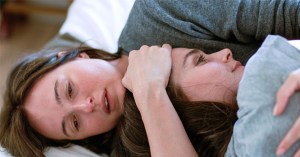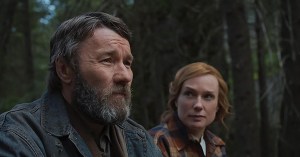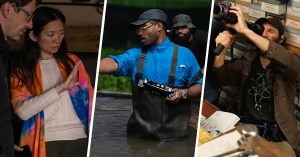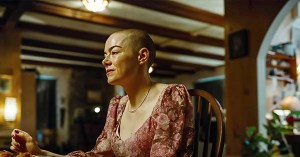Total Recall: Singers Turned Actresses
With Burlesque hitting theaters, we look at some notable thespians who started out as vocalists.
When Burlesque struts into theaters this week, it won’t just be the latest in a chorus line of movies about moneymaker shakin’ — it’ll also join the long, occasionally proud tradition of films starring singers who stepped out of the recording studio and in front of the cameras. In fact, Burlesque stars two of them: musical legend/Oscar winner Cher and — making her big-screen debut — Christina Aguilera. To celebrate all this girl power, we decided to spend this week’s feature taking a look back at some of of the most noteworthy female double threats in Hollywood history. From the Billboard charts to the box office, it’s time for Total Recall!
Mariah Carey
The Opening Act: If you’re old enough to remember 1990, you probably don’t need any help recalling Mariah Carey’s introduction to the world: the smash hit “Vision of Love,” which blended an old-school torch ballad melody with tastefully modern production — and allowed her to showcase her five-octave range in the process. For the rest of the decade, the charts belonged to Mariah…so when the 21st century rolled around, taking her to Hollywood seemed like a natural progression, right?
Perfect Pitch: Precious (2009, 91 percent) Given the rather dubious reception afforded her earlier forays into the acting world (as well as her glamorous image), it came as a real shock to see a makeup-free Carey turning up in a supporting role in one of the most critically lauded movies of 2009 — and earning some solid reviews in the process. But that’s exactly what happened with Precious, which earned Carey a variety of awards nominations (including a nod from the Screen Actors Guild) for her portrayal of a social worker. As Carrie Rickey noted for the Philadelphia Inquirer, “Harrowing and marked by heroic performances, Lee Daniels’ Precious looks squarely in the wounded eyes of its title character and sees a girl with poetry in her.”
Wrong Notes: Glitter (2001, 7 percent) When you make your Hollywood debut by producing and starring in a movie that’s supposed to be loosely based on your own life, you’re pretty much laying it all on the line. So let us applaud Mariah Carey for the chutzpah it required to film Glitter, the notorious bomb so toxic that it actually seemed, for a time, as though Carey’s career might be over. Followed by a series of profound embarrassments — the MTV striptease, the hospital stay, the EMI contract buyout — Glitter was the subject of withering scorn from critics like the AP’s Christy Lemire, who wrote, “The best parts of this dud are the ones in which she’s singing. This is what she does best. This is what she should stick to. Save your money and watch her videos for free on cable music-television networks.”
Cher
The Opening Act: Cher famously got her start in the early 1960s through Sonny Bono, who worked for the legendary producer Phil Spector and was able to score some background vocal dates for the two of them (including “You’ve Lost That Loving Feeling,” “Da Doo Ron Ron,” and “Be My Baby”) before they struck out on their own. After a few false starts with unsuccessful singles, they released “I Got You Babe” in 1965, and the rest was history — Cher started landing small movie and TV roles almost immediately, followed by the duo’s Emmy-nominated variety show and her long film career.
Perfect Pitch: Mask (1985, 92 percent) and Moonstruck (1987, 92 percent). The former earned Cher a Golden Globe and a Cannes Best Actress award for her portrayal of a fiercely protective, deeply flawed mother; the latter, a quintessential 1980s romantic comedy, brought her a Best Actress Oscar. Really, throughout the 1980s, Cher displayed remarkably sharp instincts for choosing scripts — her remarkable run during the decade included Silkwood, The Witches of Eastwick, and Suspect.
Wrong Notes: Faithful (1996, 7 percent), an adaptation of the play by Chazz Palminteri about a semi-suicidal housewife (Cher) whose adulterous husband (Ryan O’Neal) hires a hit man (Palminteri) to kill her. It sounds like the setup for some wonderfully black comedy, but critics came away disappointed, including Janet Maslin of the New York Times, who called it “mostly flat,” “thin and claustrophobic,” and “oddly bland.”
Lena Horne
The Opening Act: A four-time Grammy winner and unqualified musical legend, Lena Horne was equally at home on stage (where she won a Tony) or in front of the cameras (as evidenced by her Emmy nomination). If not for the institutionalized racism she faced early in her career — or the Hollywood blacklisting she endured in the 1950s — Horne may have spent her career dividing her time between movies and the recording studio; as it was, she only made a handful of films. Fortunately, she made most of them count.
Perfect Pitch: Horne had a part in Till the Clouds Roll By (1946, 100 percent), a loose musical biopic of composer Jerome Kern, but her work in Cabin in the Sky (1943, 80 percent) is more noteworthy — not only because she had a leading role as part of her precedent-setting deal with MGM, but because the movie had an all-black cast during a time when that meant many theaters would simply refuse to show it. For those who saw it, this Vincente Minnelli-directed musical adaptation of the legend of Faust was a thoroughly charming, albeit somewhat broad, diversion; as Rick J. Thompson wrote for Senses of Cinema, “The performances are required to be charming, deft, and knowing in order to offset the stage devices and camp of it all, and they are.”
Wrong Notes: The Wiz (1978, 37 percent) Remaking The Wizard of Oz with a modern R&B spin was an idea with a certain amount of charm, and it worked on Broadway; unfortunately, little of that charm made its way to the screen with Sidney Lumet’s adaptation of The Wiz, starring Diana Ross as Dorothy, Nipsey Russell as the Tin Man, Richard Pryor as the Wizard, Michael Jackson as the Scarecrow, and Horne as Glinda the Good Witch. Despite its undeniably interesting cast, The Wiz never came close to earning back its record-breaking budget; it is, in the words of Juicy Cerebellum’s Alex Sandell, “so bad it’s good, but not so good that I’d say that it isn’t bad.”
Beyoncé Knowles
The Opening Act: If you watched MTV or listened to Top 40 radio in the late 1990s, it was almost impossible to avoid Destiny’s Child, the R&B group whose hits included “No, No, No,” “Bills, Bills, Bills,” “Jumpin’, Jumpin’,” and, of course, “Bootylicious.” By 2004, Destiny’s Child was on indefinite hiatus, but Beyoncé had a career of her own to focus on — both in the recording studio (15 Top 40 hits and 10 million albums sold) and on the big screen.
Perfect Pitch: Dreamgirls (2006, 78 percent) Beyoncé tackled comedy with her cinematic debut, 2002’s Austin Powers in Goldmember, but she proved she could also handle drama with this Oscar-winning adaptation of the Broadway play about the rise and fall of a vocal group (Knowles, Jennifer Hudson, and Anika Noni Rose) whose friendships are tested by the trappings of fame. Though some critics were disappointed by Dreamgirls‘ simple plot and rather loosely drawn characters, it worked where it counted — the songs and dancing — and earned Hudson an Academy Award while proving Eddie Murphy can still act.
Wrong Notes: Obsessed (2009, 20 percent). Beyoncé, Idris Elba, and Ali Larter have all been in well-received movies and/or TV shows on their own — but when they came together, the result was a hackneyed thriller about an unbalanced administrative assistant (Larter) whose unhealthy fixation with her boss (Elba) puts her on a collision course to illegal hijinks and an epic catfight with his wife (Knowles). A medium-sized hit at the box office, Obsessed overcame scornful reviews from the likes of the Times’ Wendy Ide, who called it “execrable” and “a fist-chewing embarrassment that has no right to a theatrical release.”
Queen Latifah
The Opening Act: With her 1989 debut album, All Hail the Queen, Latifah helped blaze a trail for female artists in the male dominated hip-hop world; alongside artists like MC Lyte, Salt-N-Pepa, and JJ Fad, she opened the door for future generations of performers — and that wasn’t enough. By 1991, she’d started opening doors in Hollywood, with roles in films (starting with House Party 2) and television (the sitcom Living Single); just over a decade later, she had an Oscar nomination under her belt for her work in Chicago.
Perfect Pitch: Hairspray (2007, 91 percent) It shouldn’t have worked — a theatrical adaptation of a musical based on a John Waters movie, the 2007 version of Hairspray arrived in theaters as a second-generation copy of an almost 20-year-old story, complete with a cross-dressing John Travolta in a fat suit. But the new Hairspray, directed by Adam Shankman and bolstered by a cast rounded out by Christopher Walken, Zac Efron, Michelle Pfeiffer, Nikki Blonsky, and Latifah, earned more than $200 million, along with praise from critics including Paste Magazine’s Tim Basham, who called it “The most refreshing and enjoyable musical of this century.”
Wrong Notes: The Cookout (2004, 5 percent) Released the same year as the hellish Latifah/Jimmy Fallon vehicle Taxi, this ensemble comedy united one of the oddest casts in recent memory (including Ja Rule, Farrah Fawcett, Eve, Jonathan Silverman, and Latifah’s mother) and a script developed by the Queen herself to produce a spectacular critical and commercial misfire that grossed only $12 million and earned scornful reviews from writers like Jim Lane of the Sacramento News & Review, who scoffed, “Director Lance Rivera has never directed a movie before, and he doesn’t start here.”
Courtney Love
The Opening Act: Love is actually something of an actress-turned-singer-turned-actress — she appeared briefly in a handful of films during the 1980s, including Sid & Nancy — but it wasn’t until she strapped on a guitar and founded Hole that her career really took off. After hitting the charts, it didn’t take long for Love to return to acting — only this time, her fame meant she had a shot at bigger roles.
Perfect Pitch: The People vs. Larry Flynt (1996, 87 percent) Love’s loud, trashy image made her a natural choice for a biopic about the Hustler publisher — but few suspected just how eagerly she’d rise to the challenge of playing Flynt’s wife Althea. It was a role that required a full spectrum of emotions, from manic comedy to tragedy, and Love walked away with it — as well as a Golden Globe nomination and enthusiastic reviews from critics like Rob Blackwelder of SPLICEDWire, who exclaimed, “Wow. Courtney Love can act.”
Wrong Notes: Trapped (2002, 18 percent) She filmed a small part in the 1996 turkey Feeling Minnesota, but in terms of major roles, Love’s acting career hit its nadir with this thriller about a psychopath (Kevin Bacon) and his wife (Love) who kidnap the young daughter (Dakota Fanning) of a successful physician (Stuart Townsend). It was based on a bestselling novel, but that didn’t help Trapped at the box office, where it grossed barely $7 million — or with critics like Entertainment Weekly’s Lisa Schwarzbaum, who bitterly dismissed it as “a negligible work of manipulation, an exploitation piece doing its usual worst to guilt-trip parents.”
Madonna
The Opening Act: Madonna embarked on a solo recording career in 1982, quickly scoring a dance hit with her debut single and setting the stage for a dominating chart run that lasted well into the 1990s. But music superstardom wasn’t enough for Madonna — by 1985, she’d gone Hollywood with a cameo in the high school wrestling drama Vision Quest and scored her first leading role, with the critical and commercial success Desperately Seeking Susan.
Perfect Pitch: Desperately Seeking Susan (1985, 87 percent) It’s always sort of unfortunate when an actor’s first film ends up going down as their best, and Madonna surely believed Desperately Seeking Susan was just the beginning of a long and successful acting career — but even if most of her subsequent movies flopped, this comedy about a bored housewife (Rosanna Arquette) who assumes the identity of a free spirit (Madonna) was a winner with critics like Roger Ebert, who said, “It has its moments, and many of them involve the different kinds of special appeal that Arquette and Madonna are able to generate.”
Wrong Notes: Swept Away (2002, 5 percent) Oh dear. Almost a decade after it was released, it’s still hard to believe anyone responsible for Swept Away really thought it was a good idea. Written and directed by Guy Ritchie, this remake of the 1974 film about an irritating woman (Madonna) shipwrecked on a deserted island with the first mate (Adriano Giannini) was an unqualified bomb, grossing less than $600,000 and earning five Razzies (including Worst Picture and Worst Actress). Calling her “the Vera Hruba Ralston of her time,” Variety’s Dennis Harvey made the bewildered observation, “Madonna has persisted in making movies despite all evidence that this is one medium in which no one wants to see or hear her.”
Bette Midler
The Opening Act: Midler famously found the spotlight as part of a New York City bathhouse duo with Barry Manilow, who produced her 1972 debut album, The Divine Miss M. She’d tasted fame before that, however, as a member of plays both off-Broadway (Miss Nefertiti Regrets) and on (The Fiddler on the Roof) — all of which helped prepare her for chart- and box office-topping reign during the 1970s and 1980s, when she juggled hit films like Down and Out in Beverly Hills with radio favorites such as “Wind Beneath My Wings” and “From a Distance.”
Perfect Pitch: Ruthless People (1986, 90 percent) A rare straight comedy from the Zucker/Abrams/Zucker team, Ruthless People follows the misadventures of a greedy millionaire (Danny DeVito) who plans to have his wife (Midler) murdered, only to discover that she’s been taken by a pair of kidnappers (Judge Reinhold and Helen Slater) who have no idea what they’re in for. Like 1979’s The Rose (which earned her an Oscar nomination), it left plenty of room for Midler’s larger-than-life talent to shine, and audiences were all the richer for it.
Wrong Notes: Big Business (1988, 25 percent) This Lily Tomlin collaboration matched Midler’s other 1988 live-action release, Beaches, for critical futility — but where Beaches earned Midler a #1 single and a pair of Grammys, before turning into a Kleenex-dampening cult favorite, Big Business just sort of limped away from the box office and was forgotten. It’s a shame, given the talent assembled, but the ham-scented comedy and farcical plot (about a pair of twins mixed up at birth) don’t really take advantage of either star’s gifts. As Roger Ebert observed, “This is not funny. It is never funny, in this movie or any other movie.”
2. Mandy Moore
The Opening Act: Moore rose to prominence as part of the teen dance-pop craze of the late 1990s, scoring her first hit at the tender age of 15 with “Candy.” After making a few minor inroads on Top 40 radio, Moore turned away from the trendy sounds of the day, opting for more introspective (and less commercially successful) recordings while expanding the acting career she kicked off with 2002’s A Walk to Remember.
Perfect Pitch: Saved (2003, 61 percent) After leading roles in a string of fairly innocuous teen-oriented films, Moore played against type as the main antagonist in Brian Dannelly’s Saved!, a religious satire about a high school student (Jena Malone) whose boyfriend (Chad Faust) tells her he’s gay, setting in motion a chain of events that puts them on a collision course with a popular, self-righteous classmate (Moore). Though reviews weren’t overwhelmingly positive, Moore’s performance was generally singled out for praise, and it gave her a chance to flash comedic chops with a sharp, bittersweet script.
Wrong Notes: Because I Said So (2006, 5 percent) Mandy Moore with Diane Keaton and Lauren Graham in a romantic comedy — it should have been a match made in chick flick heaven, right? Nope. Because I Said So — about the struggles of a neurotic mother (Keaton) to relate to her three daughters (Moore, Graham, and Piper Perabo) — was one of the bigger flops of 2007, both with audiences (who ignored it to the tune of a $42 million gross) and critics like Richard Roeper, who stated simply, “I hated this movie.”
Olivia Newton-John
The Opening Act: Olivia Newton-John started her recording career in the mid 1960s, but things didn’t really start taking off for her until the early 1970s, when her cover of Bob Dylan’s “If Not for You” and the Grammy-winning “Let Me Be There” turned the Australian-born singer into a rather unlikely favorite on the American country music charts — and that was before she ruled the pop charts with the record-setting “Physical.”
Perfect Pitch: Grease (1978, 83 percent) She had her doubts about playing a high school student at the ripe old age of 29, but Newton-John needn’t have worried — despite the fact that the “kids” in the cast were all too old for their roles, Grease quickly became the top-grossing movie of the year (and one of the most successful musicals of all time), thanks in large part to the singin’, dancin’ chemistry enjoyed by Olivia and her on-screen beau, John Travolta. Subsequent attempts to revive the musical weren’t so lucky (including the Newton-John-led Xanadu), but Grease‘s appeal was too much for even Vincent Canby to deny, as he admitted when he wrote, “Its sensibility is not tied to the past but to a free-wheeling, well informed, high-spirited present.”
Wrong Notes: Two of a Kind (1983, 20 percent) A mere five years after they scored a smash hit with Grease, Newton-John and Travolta reunited for this notorious bomb, a comedy about a failed inventor (Travolta) who discovers that his desperate attempt to rob a bank has been foiled by a duplicitous teller (Newton-John) who pocketed the money for herself — and how their love is all that stands between the Earth and its utter destruction by a vengeful God (Gene Hackman). Doesn’t sound like something you’d ever want to see? Think again, advises Scott Weinberg of eFilmCritic: “The ‘wow’ kind of bad that people still talk about 20 years after the fact. Rent it and see.”
Take a look through the rest of our Total Recall archives. And don’t forget to check out the reviews for Burlesque.
Finally, here’s the trailer for a movie starring a reasonably well-known pop star:






